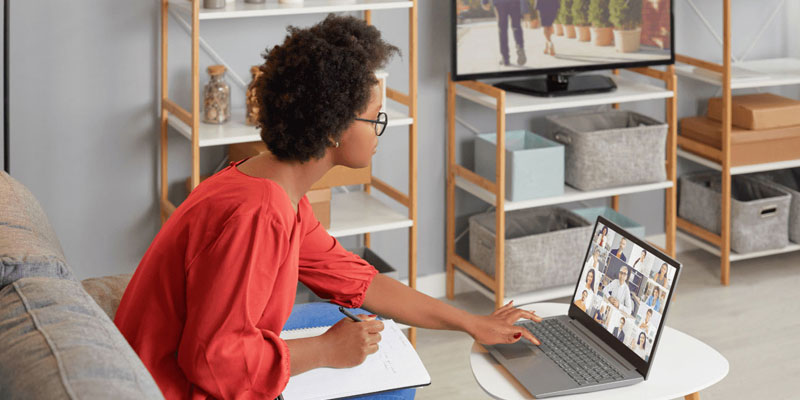Home > Career Advice > Workplace & COVID-19
Workplace & COVID-19

Coronavirus! That’s something that always gets our attention no matter what we are doing or where we are. It’s been such a terrible experience for almost everyone. It has made its way to affect everyone one way or another. You have to be exceptionally fortunate not to get impacted by covid-19, anyhow.

Financial situations and economic conditions of a family or an individual or a country or even worldwide have been affected beyond explanation. So many people lost their jobs as numerous businesses or companies have been shut down due to the excessive transmission of coronavirus. Many people did not get paid even after working their fingers to the bone because the whole economic system got sway-backed.
The whole world is still trying to figure out a way to defeat the virus. Every time scientists develop a potential solution, the virus comes out as even more dangerous and life-threatening, as if it’s mocking us. Some people still deny maintaining the basic survival rules, who are yet too egotistical to understand how contagious and infectious the virus is. It’s high time everyone got serious about it and minimised their occasional gatherings. You might be too lucky yet not to lose someone you love, but have you ever imagined the guilt and frustration of getting someone affected by you and watching them die while you survive the virus?
Workplace & COVID-19
Work from home seems to be the best and only solution to prevent any more damage. If you have an opportunity to stay at home and work, then try to do that. If you are a front line worker and have no other option, take precautions and be more conscious while working with people. You must understand the density of this pandemic and realise how quickly the virus can get transmitted from one person to a thousand in a short period of time.

How is it transmitted?
When an infected person coughs, sneezes, speaks, sings, or breathes, small liquid particles from their mouth or nose might transmit the virus. The virus spreads mostly among people who are in close contact with one another, sometimes within one metre or within a short distance. A person may get infected if virus-containing droplets are breathed or come into direct contact with their eyes, nose, or mouth. It could also proliferate in indoor spaces that are inadequately ventilated or overcrowded, where people end up spending more time in the same place. This is because particles stay suspended in the air or travel more than one metre. People often get afflicted by contacting surfaces contaminated by the virus when they touch their eyes, nose, or mouth without first washing or sanitising their hands.
Affected individuals can be infectious even if they don't show symptoms, and the virus can transmit from them to others. According to experts, infected persons tend to be most contagious right before they exhibit symptoms and in the early stage.
If the employees need to work from their workplaces, then it is mandatory to take safety precautions. Firstly, you need to make sure that the employees are tested negative for covid-19. Then make sure everyone wears a mask while around others, sanitise their hands after getting in contact with anyone or anything, and don’t get out unless it’s unavoidably important.
How to reduce the risk of getting COVID-19
All you need to do is follow the basic simple rules and mostly use your common sense. Here are some tips that you should follow:
- Keep the minimum (1 metre) distance between you and anyone else as many people out there are asymptomatic and rarely show any symptoms. Try to maintain the distance, especially when at work. If you have a desk job, then try to arrange the whole sitting system in a way that everyone is at least 1 metre away from one another.
- Keep your mask on whenever you are with others or in a crowded place. It’s even better if you wear a mask whether you have anyone near you or not. Make sure you are using a great quality mask, or it should have at least 3 layers to give you enough protection.
- At your workplace, try to keep the ventilation better. Keep the windows and doors opened so you don’t end up breathing infected droplets as closed and confined areas are prone to have the spreadability of the virus. Keep the air going in and out of your work zone.
- Try to touch the least surfaces while at work, or outside your home and wash your hands after touching anything if possible or else use a good sanitiser. You can also get all the surfaces sanitised once in a while to be extra cautious.
- Cover your mouth and nose while coughing or sneezing and clean your hands afterwards, so no one around you gets affected.
- Last but not least, GET VACCINATED. If you have the scope, then the first thing you should do is get done with the vaccination. It will enhance your immunity and give you greater chances to cope with the virus.
Key considerations for workplace risk assessment
You can take some reasonable steps to ensure the COVID-19 risk assessments, which will assist you in managing risk and safeguarding yourself and others during this pandemic. You must determine what work activities or scenarios could spread the virus, consider who could be at risk, determine how probable it is that someone would be exposed, and take action to eliminate the activity or circumstance, or, if that isn't feasible, try to reduce the risk.
feasible, try to reduce the risk. You may create a guide to help you operate safely, stay COVID-free, and handle the risks that come with owning a business at this difficult time and keep checking if everyone is following the rules or not. You should implement social barriers, schedule shifts, as well as provide extra sanitation and safety facilities. Most importantly, be more generous towards others.
Managing sanity during this pandemic
The global pandemic has been taking a toll on everyone’s mental health. Losing someone you love, having no income source or even working from home has been unconditionally tough on mental health and peace. People often do not realise how hard it is for the front line workers to keep working to help as many people as they can while they can’t meet or hug or sometimes even see their family. A few that things you can do to keep yourself, your loved ones and your colleagues safe:
- Take time to talk: There’s nothing more soothing than talking to someone you love, connecting with them. It will help you get away with all the stressful events surrounding you, as well as the person’s whom you’re talking to. Just asking how are you feeling or how’s your day going can bring a smile to someone's face.
- Take time to talSupport your grieving friend or family: You may never know what the other person is going through. So always try to be extra nice to them and be there for them. They may have faced some personal loss or go through a frustrating phase in their life that they are not comfortable sharing with anyone. Make sure while helping them out, you don’t put extra pressure on them.k: There’s nothing more soothing than talking to someone you love, connecting with them. It will help you get away with all the stressful events surrounding you, as well as the person’s whom you’re talking to. Just asking how are you feeling or how’s your day going can bring a smile to someone's face.
- Help those who are new to technology: Working from home itself is very hard, then tackling technologies can be even harder for someone who’s not that used to using technology. Be more patient with them, give them time to understand what to do and how to do it, don’t rush them into doing work.
- Take a break: Make time for yourself, do something that distracts you from all the stress. Try watching comedy shows or reading more. Don’t let the pandemic get the worst out of you. Be strong and have patience. This time will pass by.
- Be more active: Following the local rules to prevent any more spreading of the virus is already getting harsh on everyone’s emotional health. In this situation, it’s normal to feel like laying on your bed the whole day and doing as little work as possible. But don’t let this laziness snitch out your productivity. Walk around the house, practise yoga or work out, think about different things.
- Take care of your physical health: Take deep breaths when you feel everything around you negatively affects you and calms yourself down. Try to eat well balanced healthy food, avoid excessive consumption of alcohol or smoking, stay in contact with your doctor.
Your life and safety are in your hands now. Don’t make it harder for the emergency workers by unnecessarily going out just for momentary happiness. Be more premeditated and sentimental. Understand that the more you will avoid gatherings, the more likely you will be safe.
Evaluate risks and develop solutions
This pandemic has affected everyone’s work one way or another. How long can people avoid going to work? As you need to work to take care of your family, the companies also need workers to keep running their businesses. So things need to be done under strict supervision and precautions.
- Manage focus groups: It may be useful when it comes to determining who is likely to be affected and how they will be affected. During these group conversations, new topics frequently surface. This might be due to more recent changes in working circumstances, such as those brought on by organisational change. It might, however, be because focus groups allow employees to talk, evaluate, and express concerns in ways they may not have had the opportunity to do before.
- Link problems to solutions: Use focus groups to explore potential solutions to problems. Because they are often closest to the issues identified, they may know better what will work in practice and what will not work. They are more likely to help ensure the success of any agreed actions if they were involved in the development and agreement of solutions.
- Execute plans: A suggested or preliminary action plan, which contains proposals and recommendations for action at various levels of the organisation, is an important output. Because there may be several initial action plans created by various groups, they will need to be reviewed and combined into a single organisation-wide execution plan.
- Explore the results: Always maintain communication with management, employees, and their representatives throughout the process. It's an excellent strategy to share the outcomes of the execution plans with the participants as soon as possible.













